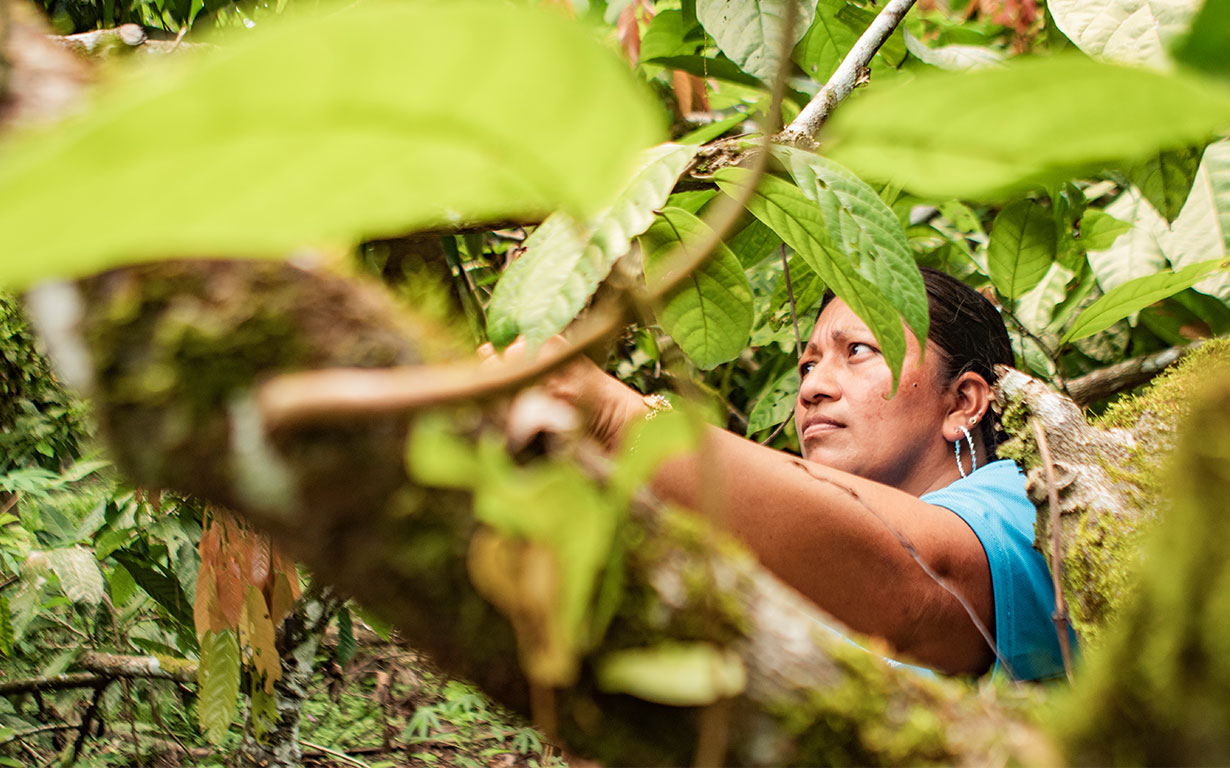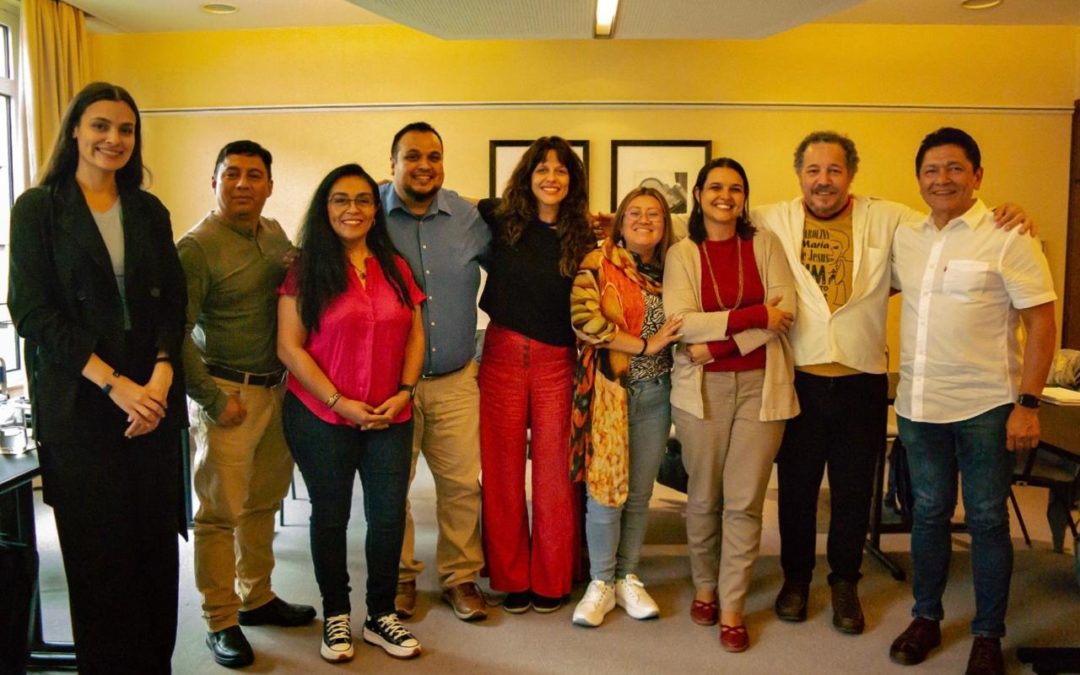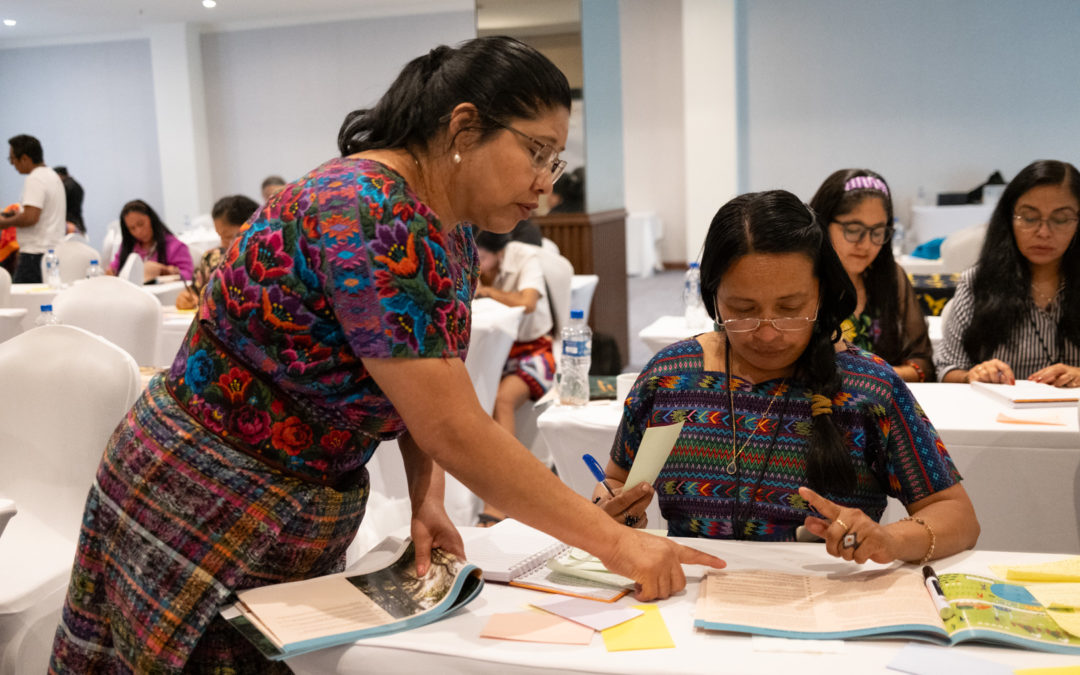From April 06th to 08th, in Panama City, Panama, indigenous peoples and local communities will join the regional forestry dialogue in one voice. The Mesoamerican Alliance of Peoples and Forests (AMPB) will position its proposals and visions during the First Regional Congress on Sustainable Forests and Landscapes.
The First Regional Congress on Forests and Sustainable Landscapes, convened jointly by the Ministry of the Environment of Panama, the Central American Commission for Environment and Development (CCAD), the AMPB and other allies, is a space for exchange which will bring together leaders of indigenous peoples and forest communities, government officials, civil society organizations, research centers and donors from Central America and the Dominican Republic, to discuss the main challenges in the region in the fight against climate change, sustainable management of forests in conservation efforts, the real participation of communities guaranteeing their rights, the vital role of women and youth as key actors for forest governance and the challenges posed by the post-COVID context -19.
The Congress will address different topics of interest, grouped into three major symposiums:
- Forests and Landscapes. Management, Conservation and Restoration
- Forests and Landscapes. The contribution of the Communities and Indigenous Peoples (organized by the AMPB)
- Forest Governance
Within the framework of the Congress, the AMPB has organized two spaces for dialogue to contextualize the forestry agenda from the community reality: the Symposium “Forests and Landscapes: The contribution of communities and indigenous peoples” and the Pavilion “Bosques de Gente”. Learn more:
Forests and Landscapes Symposium: The contribution of indigenous communities and peoples
The Symposium “Forests and Landscapes: The contribution of indigenous communities and peoples” is an official space of the First Regional Congress on Sustainable Forests and Landscapes. The Symposium will put into perspective the role of indigenous peoples and local communities in forest management, care and conservation. At the same time, it will highlight the successful experiences in the region in terms of agreement between governments and communities, which shows a unique region in the world to advance policies, programs and projects for the conservation of biodiversity, the protection of forests, the strengthening of community livelihoods and local economies and addressing climate change. The activity will discuss the main challenges in the region regarding the participation of forest communities in markets.
The Symposium seeks to promote dialogue between Central American forestry authorities and local organizations that manage forests, on the challenges surrounding the sustainable management of Mesoamerican forests by recognizing their integrality as livelihoods. In addition, it is intended to contribute to the exchange of experiences in forest management among community actors and identify the potential for strengthening local capacities and traditional knowledge; promote a joint regional vision in the design of a market strategy that stimulates and increases local benefits; and identify synergies and opportunities for collaboration between forest communities and actors related to Mesoamerican forests.
To follow the broadcasts of the First Regional Congress on Sustainable Forests and Landscapes, visit the CCAD profile and follow the AMPB profile.
Descargar programa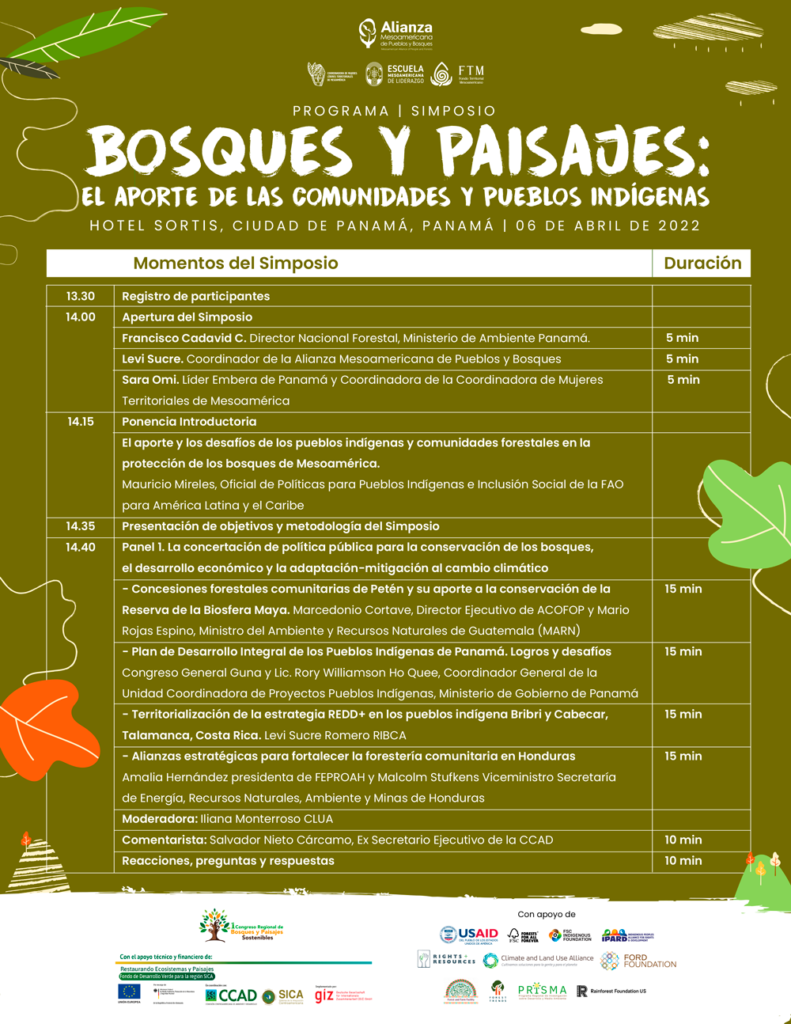
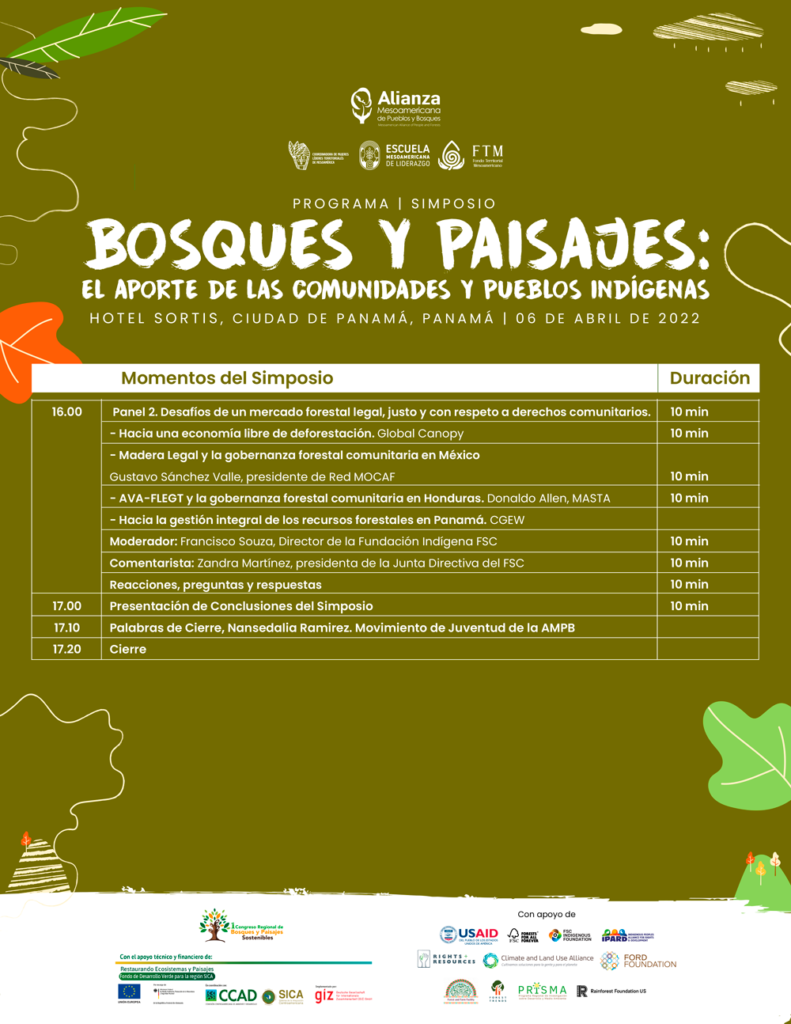
Forests of People Pavilion: present territorial voices
The Forests of People Pavilion to be held as an integral part of the First Regional Congress on Sustainable Forests and Landscapes, will be a space to delve into good practices, lessons learned and challenges of the indigenous peoples and local communities of Mesoamerica.
Through conversations with a territorial vision, the Pavilion has the objective of generating dialogues to identify agendas and common points between the organizations of indigenous peoples and forest communities, the government instances in the matter of forests, research centers, civil society organizations and international cooperation, with the objective to strengthen conservation efforts and sustainable management of forests and landscapes.
Follow the live broadcast of all the panels of the Forests of People Pavilion on our YouTube channel.
In alliance with Tv Indígena, we will have interviews about the activities with territorial authorities and daily summaries of the dialogues on our Facebook profile.
Descargar programa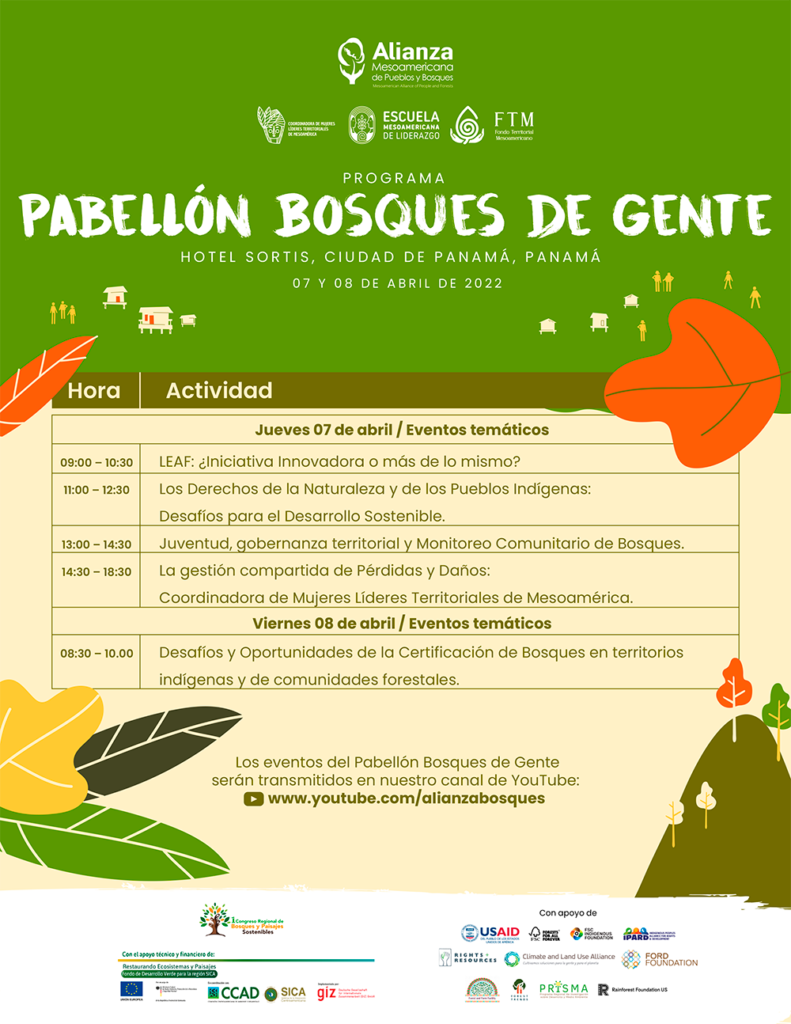
Indigenous peoples and local communities: why they are relevant to the forestry agenda
In Mesoamerica, Indigenous Peoples and Local Communities have an influence on approximately 50 million hectares of remaining forests, therefore, strengthening the rights and community governance practices that have conserved these forests is crucial to protect them and sustain their contributions in terms of climate balance, biodiversity, water production and food security. Recent reports indicate that Mesoamerican forests contain 47% of the region’s forest carbon stocks, about 8% of the world’s biodiversity, and provide the livelihood for more than 5 million people who depend on them.
The management of forests in the hands of communities in the region has generated unique experiences of forest governance and dialogue mechanisms that directly contribute to the formulation of policy frameworks, laws and instruments for sustainable forest management. These forest governance schemes have resulted in successful models that have been socialized in the different countries of the region and internationally, through forums and forestry congresses, constituting examples at a global level that have allowed strengthening the models, exchanging experiences and standardizing key elements of success.
These activities are carried out with the technical and financial support of the European Union, the Federal Ministry for the Environment, Nature Conservation and Nuclear Safety and Consumer Protection (BMUV), within the framework of the International Climate Initiative (IKI) through the Green Development Fund for the SICA Region, an initiative implemented by the German Development Cooperation, GIZ, in coordination with the Central American Commission for Environment and Development (CCAD). We also have support from the Global Alliance of Indigenous Peoples for Rights and Development (IPARD) of the FSC Indigenous Foundation; Rights and Resources Initiative (RRI); Climate and Land Use Alliance (CLUA); the Ford Foundation; Forest and Farm Facility (FFF); Forest Trends; Prism Foundation; and Rainforest Foundation US.
